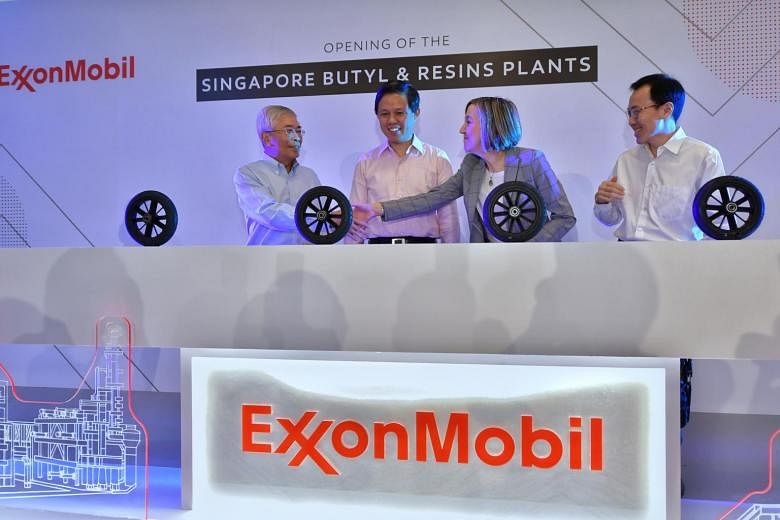SINGAPORE - Singapore will work with its industries as it moves to meet standards of a low-carbon future, while remaining competitive with its strong connectivity and intellectual property (IP) regime, said Trade and Industry Minister Chan Chun Sing on Friday (April 5).
Describing the need to constrain emissions as "a new mountain to climb", Mr Chan noted the importance of working with companies, such as energy giant ExxonMobil, that invest in technology for building more sustainable products.
"Today, the world is much more competitive for the next investor dollar. Our job is to make sure that we continue to provide that progressive environment, not just in... the kind of relationship that we have (with companies), but also in the kind of rules that we can have," he added.
Speaking at the official opening of ExxonMobil's butyl rubber and resin plants on Jurong Island, Mr Chan said such rules include a strong IP regime as well as regulations allowing companies to have data-enabled technologies.
ExxonMobil's new plants are part of a multi-billion-dollar expansion project, and its products go some way in reducing emissions.
The plants also add 140 jobs - such as engineers and technicians - to its workforce of over 4,000 in Singapore. Another 100 logistic jobs were also created at its packaging and warehouse facility on-site, run by a Singapore-based company.
The energy giant's regional growth plans include increasing the number of such facilities, said Ms Karen McKee, president of ExxonMobil Chemical Company. She added that there is growing demand for synthetic rubber and adhesives here.
Ms McKee also said that about half of the world's economic growth between now and 2040 will occur in this region.
Global demand for the chemical industry has doubled since 2000 and this is expected to grow about 4 per cent annually for the next 20 to 30 years, faster than overall energy demand growth.
"Singapore is a critical component of that story, not only as an energy and manufacturing hub, but also as a centre for technology and for skills development," she added.
As a result of dynamics in the region, ExxonMobil has embarked on an "aggressive growth plan" to double its earnings by 2025, she added, pointing to the two new plants as key moves.
One of the plants produces up to 90,000 tonnes of Escorez hydrogenated hydrocarbon resins a year, aimed at meeting long-term demand growth for hot-melt adhesives used in packaging and diapers. It started operations in December 2017.
The second plant, which is expected to start commercial production in the second half of the year, produces up to 140,000 tonnes of premium halobutyl rubber a year - a substance used by tyre manufacturers to maintain inflation.
Keeping tyres properly inflated can help to save about a billion gallons of fuel, reducing carbon dioxide emissions by eight million tonnes a year, said ExxonMobil.
The official opening on Friday follows a series of expansion announcements by the company, which said on Tuesday that it will take on another multi-billion-dollar project to grow its facilities on Jurong Island.
This will raise its output of cleaner fuel amid more stringent environmental rules for the shipping industry from 2020 - a shift that shipping and oil refining industries have been scrambling to prepare for.
In an opening speech, ExxonMobil Asia Pacific chairman and managing director Gan Seow Kee said the company invests about $1 billion a year in research and development worldwide.
He noted that the plants use new technologies. For example, their warehouse uses a robotic arm that can pack a 34kg butyl bale every seven seconds, and driverless forklifts that automate product movements in the warehouse.


